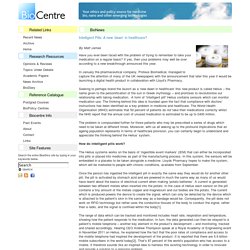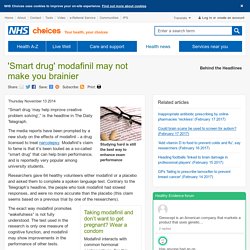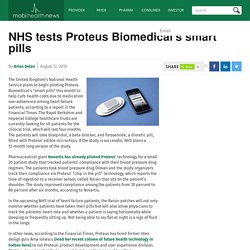

Intelligent Pills: A new ‘dawn’ in healthcare? By Matt James Have you ever been faced with the problem of trying to remember to take your medication on a regular basis?

If yes, then your problems may well be over according to a new breakthrough announced this year. In January the pharmaceutical company, Proteus Biomedical, managed to capture the attention of many of the UK newspapers with the announcement that later this year it would be launching a digital health product in collaboration with Lloyd’s Pharmacy. Seeking to perhaps brand the launch as a ‘new dawn in healthcare’ this new product is called Helius – the name given to the personification of the sun in Greek mythology – and promises to revolutionise our relationship with taking medication. A form of “intelligent pill” Helius contains sensors which can monitor medication use. The problem is compounded further for those patients who may be prescribed a series of drugs which need to be taken at different times. How do intelligent pills work? Is it as cutting edge as it seems? [2] NHS to launch 'intelligent' pill that texts you if you have forgotten to take your next dose.
By Jenny Hope for the Daily Mail Updated: 14:54 GMT, 14 August 2010 A 'smart' pill that texts patients' mobile phones if they forget to take their medication is being tested in the UK.

Around 40 volunteers are being recruited by NHS doctors to take standard versions of their heart pill fitted with a microchip. The chips in the pills send signals to a patch attached to the patient's shoulder when swallowed. The Raisin: The system contains a pill with an edible microchip and a patch that sits on the shoulder which texts information to either the doctor or patient Technology in the patch monitors when the pills are swallowed and can send a text if the patient forgets to take medication. The system, known as Raisin, also monitors heart rate, heart activity and how well the patient is sleeping - all of which may signal a deteriorating condition. 'Smart drug' modafinil may not make you brainier. Thursday November 13 2014 Studying hard is still the best way to enhance exam performance “Smart drug ‘may help improve creative problem solving’,” is the headline in The Daily Telegraph.

The media reports have been prompted by a new study on the effects of modafinil – a drug licensed to treat narcolepsy. Modafinil’s claim to fame is that it’s been touted as a so-called “smart drug” that can help brain performance, and is reportedly very popular among university students. Researchers gave 64 healthy volunteers either modafinil or a placebo and asked them to complete a spoken language test. The exact way modafinil promotes “wakefulness” is not fully understood. Modafinil is a prescription-only medicine that is licensed only for the treatment of narcolepsy. Drug regulators say that the benefits of modafinil only outweigh the risks for the treatment of narcolepsy.
Where did the story come from? The study was published in the peer-reviewed journal PLOS One. NHS tests Proteus Biomedical's smart pills. The United Kingdom's National Health Service plans to begin piloting Proteus Biomedical's "smart pills" this month to help curb health costs due to medication non-adherence among heart failure patients, according to a report in the Financial Times.

The Royal Berkshire and Imperial College healthcare trusts are currently looking for 40 patients for the clinical trial, which will last four months. The patients will take bisoprolol, a beta-blocker, and furosemide, a diuretic pill, fitted with Proteus' edible microchips. If the study is successful, NHS plans a 12-month long version of the study.
Pharmaceutical giant Novartis has already piloted Proteus' technology for a small 20 patient study that tracked patients’ compliance with their blood pressure drug regimen. For more, read this report from FT.com (free reg. req.) Le médicament qui envoie un SMS au médecin. L'électronique intéresse l'industire pharmaceutique Le développement électronique engendre un nombre toujours croissant de possibilités pour l’industrie pharmaceutique.

Dr. Peter Frey de l’hôpital universitaire de Berne explique que les technologies électroniques représentent l’avenir de l’industrie pharmaceutique. Selon des analystes de Ernst & Young, des entreprises spécialisées dans l’électronique vont peu à peu faire leur apparition avec de nouvelles idées pour profiter de ce marché. Afin de ne pas être dépassés, les entreprises pharmaceutiques sont presque obligées de collaborer avec ces entreprises spécialisées dans l’électronique. Une micropuce est intégrée dans les comprimés. Nommée Smart Pills, cette technologie sera en vente d’ici à la fin de l’année en Angleterre. Polémique autour du secret médical Si tout semble sous contrôle du point de vue sanitaire, des questions se posent quant au secret médical.